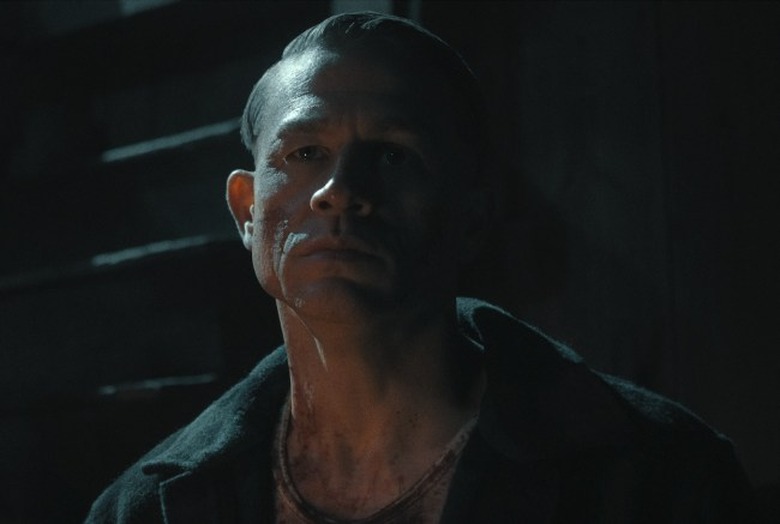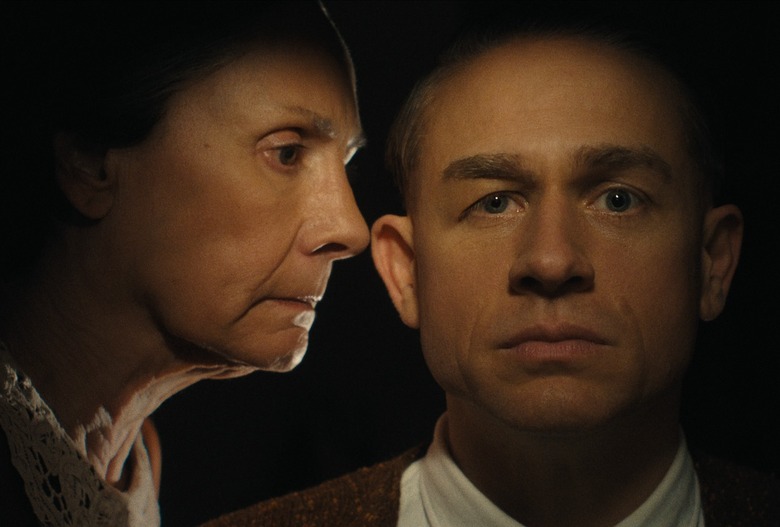Monster's Charlie Hunnam 'Really Grappled' With Whether Retelling Ed Gein's Story Was A Good Idea: 'You Have To Go Into The Darkness To Find The Light'
Near the start of Episode 2 of Monster: The Ed Gein Story on Netflix, legendary director Alfred Hitchcock and Psycho author Alfred Bloch meet for dinner. It's 1959, a few years after police first discover Gein's murders and grave-robbing and a year before Hitchcock's film adaptation of Bloch's book will become a cinematic legend. Hitchcock wants to understand how Gein, on whom Psycho is loosely based, became capable of such acts.
Bloch explains that Gein (played in the series by Sons of Anarchy's Charlie Hunnam) was diagnosed with schizophrenia and seems to have been triggered after seeing photographs of Nazi atrocities. "And had he not seen them?" Hitchcock asks. "He might have stayed a small-town simpleton," Bloch muses. "Such is the power of the photographed image," Hitchcock intones.
It's a bold statement for the Ryan Murphy/Ian Brennan series to make, given its own extremely disturbing, graphically depicted photographed images. By including Hitchcock, the show explores not only Gein and his crimes but also society's fascination with them: If we all don't want to see such horrible acts, it muses, why do we so often flock to them when they're presented as entertainment?
"This whole series, it turns the camera right on us," Brennan told Netflix's Tudum. "It really matters what you look at and the images and stories you consume. They do stick with you, and they do have an impact."
I wondered what Hunnam's thoughts were on the matter, so we talked about it when he recently was in New York promoting the series.
"The why of this, I really grappled with," he said. "Because I do not want to be responsible for putting negative, dark material out in the world." Still, he says, he was very deeply on board the project from the moment Murphy pitched him. Read on to hear what Hunnam had to say about how he came to think that "maybe there is some value in exploring a man like this and what he did."
TVLINE | You signed on to this not having seen any scripts, that's correct?
CHARLIE HUNNAM | That's right.
TVLINE | OK, this is not lighthearted fare. When you did get the pages in front of you, was there ever a scene or an episode where you were like, "Oh, s—t? I have to do this?"
All of it. I felt like that, though, just from my initial conversation with Ryan, where we talked for about three hours. It was so sincere and complex, what he was trying to do with the show. He talked me through the whole thing. So although I hadn't read the episodes, I kind of knew exactly what we were going to be doing. And then when I read the scripts, it was a relief. Because prior to that, all I'd gotten to be able to read was all of the books and literature that had been written about Ed, and they're all kind of a terrible celebration of the grotesque.
TVLINE | Schlocky.
Yeah. This horrible, gratuitous writing. So I was relieved when I finally got to read the scripts because it brought me back to remembering exactly what we were making the show about.

TVLINE | There's a moment where someone says that maybe if Ed hadn't been exposed to depravity, he would've never committed these acts.
Right.
TVLINE | I'm wondering what you think of that, having been so inside this man for such a long time.
I think we ask a very important and courageous question for Ryan Murphy. He sort of turns that lens on himself in the show. One of the things that we learned in research is that a huge negative impact on Ed was exposure to images and these horrible graphic novels that came out exploring the atrocities of the second world war. They blew his mind and traumatized him, and the way that he processed that, weirdly, was to repeat it, to try to normalize it. Of course, then Hitchcock takes this idea and makes Psycho, which is a huge departure in the way that we explore villains and depravity. It makes it really human, where we become the monsters for the first time. And so we see the consequence of that, and arguably, that had, well, a very big impact on the collective American and global psyche. And then we ask, "Are we perpetuating that cycle, by making this show?" And "Are you perpetuating it by being an audience member?" And why do we tell these stories?
The why of this, I really grappled with. Because I do not want to be responsible for putting negative, dark material out in the world. I feel like there's enough darkness. But I think that, you know, the old dragon's cave: The gold represents the light. I think you have to go into the darkness to find the light. And if we're going to illuminate some elements of the human condition that exist, which is steeped in darkness and evil, we can expose the mechanisms that lead to that. Maybe there is some value in exploring a man like this and what he did.
TVLINE | Was there a piece of wardrobe or mannerism of Ed's that really helped you lock in to him each day?
It sorta happened before any of the physical stuff, just in the research and thinking about him and thinking about him. Initially, to me, it's always like staring outside across a vast football field at this character at the end. It feels obscure. Or, like I said earlier, you think about it being behind a piece of bulletproof glass and you're staring at this person on the other side. And little by little, you end up realizing you're on the other side and you are inside this thing. What I found from all of my research — and there is an amazing chronicle of his medical records available, because he was in a mental institution or hospital for the criminally insane for 30 years and did all of these quarterly reviews. And they are very in depth. Questions-and-answers between his doctors and their interpretation of his answers and their professional review of who he was and what he was doing. What just comes across over and over again is how gentle and naïve and childlike he was, and yet absolutely responsible for these atrocities. And so that juxtaposition, the middle ground of that, is where we spent our time exploring.
In terms of my entry point to him, just understanding that this wasn't a monster that was going to be scowling in the shadows and looking for any opportunity to hurt someone. He was looking for love and looking for connection, and finding it in all of these perverse and dark ways. It made it really human to me. I found a sense that I felt like I understood him and felt like I could make [the role] human — because that's more scary. If you just play a ghoul — they called him the "Butcher of Plainfield"— it doesn't tell us anything about the human condition. If you make him honest and relatable, that's the basis. And then he starts to go off in wild directions, and you ask the question: What are you doing? And how has this happened? And how can we make sure this doesn't happen again?
What are your thoughts on Monster: The Ed Gein Story, its visuals and the themes the season explores?
